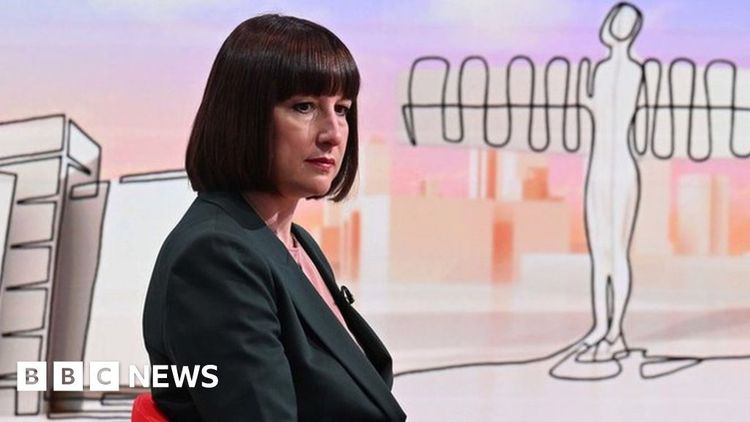Rachel Reeves: Labour won't be able to turn things around immediately

According to Reeves, it won't be easy for the Labour party to make a quick turnaround and change the current situation.
Rachel Reeves has stated that if Labour is elected, they will not be able to immediately fix the situation.
During an interview with Laura Kuenssberg on the Sunday program of the BBC, the person in charge of finance for the opposition party did not fully reject the possibility of reducing spending in certain sectors. He explained that if Labour were to come into power, they would be faced with an economy that is in its worst shape since the Second World War.
She stated that she will carefully and systematically search for ways to finance current commitments made regarding the NHS and educational institutions.
According to the Conservatives, Labour did not possess a strategy to fund their proposals.
The conversation occurred a couple of days following Chancellor Jeremy Hunt's announcement of the government's expenditure and taxation strategies during his Budget speech. This included a reduction in National Insurance and an extension of child benefit.
According to Mr Hunt, the economy will be on the upswing very soon. The country experienced a slowdown which resulted in a recession towards the end of last year.
Copying the policies of the Labour party, he expressed his intention to abolish the non-dom tax status and prolong the windfall tax imposed on oil and gas businesses.
Earlier, the Labour party claimed that they will make use of the two billion pounds they anticipated to generate from these modifications for enhancing the National Health Service and extending meal services in educational institutions.
Nonetheless, Mr. Hunt has assigned these resources to support the decrease in National Insurance payments, a measure Labour has asserted it would refrain from overturning in the event of achieving authority.
When questioned about how the Labour party plans to compensate for the lack of money to cover their expenses, Ms. Reeves elaborated that she will conduct a thorough analysis of all the relevant government documentation to locate the source of funds necessary to fulfill those commitments.
"We'll ensure that it is done in a systematic manner."
Additionally, she highlighted the party's proposals to impose taxes on private equity managers and implement Value Added Tax (VAT) as well as business rates on private educational institutions.
Ms Reeves has stated that Labour will maintain the current reduction of capital gains tax for the sale of secondary properties, which was initially proposed by Mr. Hunt. She stated that the Office for Budget Responsibility has evaluated this reduction and has concluded that it would generate profit.
This year, a nationwide voting will likely occur, and as the party currently in the lead according to polls, the Labor party's strategies regarding taxation and expenses are being examined more closely.
Within his Budget, Mr. Hunt announced that he intended to maintain a previously arranged boost in routine public expenditures by 1% beyond inflation on a yearly basis until 2029.
Nonetheless, this implies that particular sections may undergo major reductions in their funds, since certain domains of government expenses, notably education and healthcare, receive safeguarded funding.
Right after the Budget announcement, the Institute for Fiscal Studies, an organization dedicated to analyzing finances, accused both Conservatives and Labour of keeping quiet about the considerable choices and compromises that will have to be made after the election. These choices will include incredibly difficult decisions about spending public services.
Paul Johnson, who is leading the Institute for Fiscal Studies (IFS), has warned that departments without protection might experience a reduction of £20 billion in their everyday expenses.
Ms Reeves acknowledged that if Labour wins the election, they will inherit the most challenging situation since WWII. She stated that she has no doubts about the fact that they might need to implement cuts in certain areas.
To tell you the truth, it will take some time before we can make improvements, but we will start working on it.
According to her, Labour plans to increase growth by investing £7.3bn in a National Wealth Fund aimed to encourage private investment in the economy that doesn't produce greenhouse gases.
The party made an announcement on Sunday revealing that Mark Carney, who previously served as the governor of the Bank of England, and C.S. Venkatakrishnan, who is the current boss of Barclays, have been appointed to a task force. Their role will be to provide advice to the Labour party on how best to put the fund into action.
The person in charge of the opposition party's financial plan also mentioned that their proposal for employee rights, including granting full employment benefits from the first day of work, is favorable towards both businesses and employees, and will be included in their list of policies for the upcoming election.
In response to Ms Reeves' interview, the top officer in charge of the Treasury, Laura Trott, stated that the Labour party did not provide any details on how they plan to finance their "non-budgeted expenses".
This is due to their lack of a payment strategy, resulting in elevated taxes and ultimately leading us right back to where we started.









































